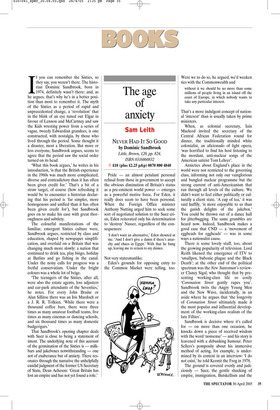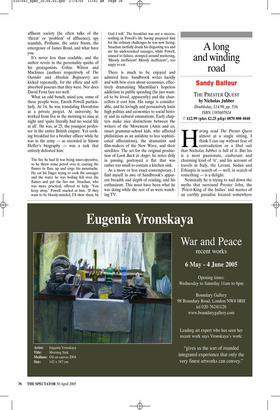The age of anxiety
Sam Leith
NEVER HAD IT SO GOOD by Dominic Sandbrook Little, Brown, £20, pp. 824, ISBN 0316860832 ✆ £18 (plus £2.25 p&p) 0870 800 4848 If you can remember the Sixties, so they say, you weren’t there. The historian Dominic Sandbrook, born in 1974, definitely wasn’t there: and, as he argues, that’s why he’s in a better position than most to remember it. The myth of the Sixties as a period of rapid and unprecedented change, a ‘revolution’ that in the blink of an eye tuned out Elgar in favour of Lennon and McCartney and saw the Kids wresting power from a series of vague, tweedy Edwardian grandees, is one constructed, with nostalgia, by those who lived through the period. Some thought it a disaster, most a liberation. But more or less everyone, Sandbrook argues, seems to agree that the period saw the social order turned on its head.
‘What this book argues,’ he writes in his introduction, ‘is that the British experience in the 1960s was much more complicated, diverse and contradictory than it has often been given credit for.’ That’s a bit of a straw target, of course (how refreshing it would be to encounter a historian declaring that his period is ‘far simpler, more homogenous and unified than it has often been given credit for’), but Sandbrook goes on to make his case with great thoroughness and subtlety.
The colourful manifestations of the familiar, emergent Sixties culture were, Sandbrook argues, restricted by class and education, shaped by newspaper simplification, and overlaid on a Britain that was changing much more slowly: a nation that continued to drink tea, play bingo, holiday at Butlins and go fishing in the canal. Under the noisy calls for progress was a fretful conservatism. Under the bright colours was a whole lot of beige.
‘The teenagers of the Sixties, after all, were also the estate agents, loss adjusters and car-park attendants of the Seventies,’ he notes. For every John Braine or Alan Sillitoe there was an Iris Murdoch or a J. R. R. Tolkien. ‘While there were a thousand coffee bars, there were three times as many amateur football teams, five times as many cinemas or dancing schools, and six thousand times as many domestic budgerigars.’ That Sandbrook’s opening chapter deals with Suez is close to being a statement of intent. The underlying note of this account of the germination of the Sixties is — milkbars and jukeboxes notwithstanding — one not of exuberance but of anxiety. There resonates through the narrative the unhelpfully candid judgment of the former US Secretary of State, Dean Acheson: ‘Great Britain has lost an empire and has not yet found a role.’ Pride — an almost petulant personal refusal from those in government to accept the obvious diminution of Britain’s status as a pre-eminent world power — emerges as a powerful motive force. For Eden, it really does seem to have been personal. When the Foreign Office minister Anthony Nutting urged him to seek some sort of negotiated solution to the Suez crisis, Eden reiterated only his determination to ‘destroy’ Nasser, regardless of the consequences:
‘I don’t want an alternative,’ Eden shouted at me. ‘And I don’t give a damn if there’s anarchy and chaos in Egypt.’ With that he hung up, leaving me to return to my dinner.
Not very statesmanlike.
Eden’s grounds for opposing entry to the Common Market were telling, too. Were we to do so, he argued, we’d weaken ties with the Commonwealth and
without it we should be no more than some millions of people living in an island off the coast of Europe, in which nobody wants to take any particular interest.
That’s a more indulgent concept of national ‘interest’ than is usually taken by prime ministers.
When, as colonial secretary, Iain Macleod invited the secretary of the Central African Federation round for dinner, the traditionally minded white colonialist, an aficionado of light opera, ‘was horrified to find his host listening to the mordant, anti-nuclear songs of the American satirist Tom Lehrer’.
Anxieties about England’s place in the world were not restricted to the governing class, informing not only our vainglorious and bungled nuclear programme but the strong current of anti-Americanism that ran through all levels of the culture. We didn’t want to feel either politically or culturally a client state. ‘A cup of tea,’ it was said huffily, ‘is more enjoyable to us than the garish delights of the jukebox.’ You could be thrown out of a dance hall for jitterbugging. The same grumbles are heard now. Indeed, Sandbrook makes a good case that CND — a ‘movement of eggheads for eggheads’ — was in some ways a nationalist cause.
There is some lovely stuff, too, about the growing popularity of television. Lord Reith likened the emergence of ITV to ‘smallpox, bubonic plague and the Black Death’; at the other end of the political spectrum was the New Statesman’s reviewer Clancy Sigal, who thought that by presenting working-class life so cosily ‘Coronation Street gently rapes you’. Sandbrook twits the Angry Young Men and the New Wave, incidentally, in an aside where he argues that ‘the longevity of Coronation Street ultimately made it the most popular and influential development of the working-class realism of the late Fifties’.
Sandbrook is decisive where it’s called for — on more than one occasion, he knocks down a piece of received wisdom with the word ‘nonsense’ — and his story is leavened with a debunking humour. Peter Sellers’s pomposity about his immersive method of acting, for example, is undermined by its context in an interview: ‘I do not exist,’ he told Kermit the Frog in 1978.
The ground is covered evenly and judiciously — Suez, the gentle shucking of empire, immigration, Butskellism and the affluent society (he often talks of the ‘threat’ or ‘problem’ of affluence), spy scandals, Profumo, the satire boom, the emergence of James Bond, and what have you.
It’s never less than readable, and the author revels in the personality quirks of his protagonists. Colins Wilson and MacInnes (authors respectively of The Outsider and Absolute Beginners) are kicked repeatedly, for the effete and selfabsorbed poseurs that they were. Nor does David Frost fare too well.
What an odd bunch, mind you, some of these people were, Enoch Powell particularly. At 14, he was translating Herodotus as a private project. At university, he worked from five in the morning to nine at night and ‘quite literally had no social life at all’. He was, at 25, the youngest professor in the entire British empire. Yet cooking breakfast for a brother officer while he was in the army — as recorded in Simon Heffer’s biography — was a task that entirely defeated him:
The fire he had lit was being unco-operative, so he threw some petrol over it, causing the flames to flare up and singe his moustache. He cut his finger trying to cook the sausages and the water he was boiling fell over the flames and put the fire out. Strachan, who was more practical, offered to help. ‘You keep away,’ Powell snarled at him. ‘If they want to be bloody-minded, I’ll show them, by God I will.’ The breakfast was not a success, nothing in Powell’s life having prepared him for the culinary challenges he was now facing. Strachan tactfully drank his disgusting tea and ate his undercooked sausages, while Powell, unused to failure, stomped around muttering, ‘Bloody inefficient! Bloody inefficient!’, too angry to eat.
There is much to be enjoyed and admired here. Sandbrook writes lucidly and with brio even about economics, effectively dramatising Macmillan’s hopeless addiction to public spending (he just wanted to be loved, apparently) and the chancellors it cost him. His range is considerable, and he lovingly and persuasively knits high politics and economics to social history and its cultural emanations. Early chapters make nice distinctions between the writers of the Movement (Amis and co, smart grammar-school kids, who affected philistinism as an antidote to less sophisticated affectations), the dramatists and film-makers of the New Wave, and their satellites. The set for the original production of Look Back in Anger, he notes drily in passing, portrayed a flat that was rather too small to contain a kitchen sink.
As a more or less exact contemporary, I find myself in awe of Sandbrook’s apparent breadth and depth of reading, and his enthusiasm. This must have been what he was doing while the rest of us were watching TV.





















































 Previous page
Previous page